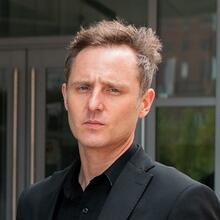“Humanistic Engineering: Engineering for the People,” Matthew Bolton, UVA

INTERDISCIPLINARY CENTER FOR BIOETHICS: TECHNOLOGY & ETHICS WORKING GROUP
Abstract: Technology continues to advance, improving productivity and changing the way people work and live. However, there are broad indicators that it is also contributing to societal problems. These problems are complex, but engineering is complicit. It designed the technology that undermined the value of labor, privatized public resources, funneled wealth and power upward, and sacrificed human well-being for short-term profit. However, technology is not inherently opposed to human progress. As the ones that design technology, engineers control a critical point in determining how technology will affect society. Thus, they have a unique opportunity to make change. This talk explores how the current situation developed and proposes a method for addressing it called humanistic engineering. Humanistic engineering seeks to reformulate engineering around humanistic values by ensuring that all engineered technology is human-centered, inclusive/accessible, sustainable, democratic, and empowering. Critically, humanistic engineering adopts a model of power, one where developments enable engineers and the populous to drive work and society in humanistic directions. If widely implemented, humanistic engineering has the potential for profound impact: making society more sustainable and equal while distributing wealth, resources, and power more justly. Finally, humanistic engineering should have many potential indirect benefits including improved diversity in engineering, reduced workplace discrimination, and greater engineering creativity.
Please email Working Group Chair Joe Carvalko to receive an event announcement with the link to join on Zoom.
Matthew Bolton is an Associate Professor of Systems Engineering at the University of Virginia (UVA). He obtained his Ph.D. in Systems Engineering from the University of Virginia, Charlottesville, in 2010. Before joining UVA as faculty, he worked as a Senior Research Associate at NASA’s Ames Research Center and held academic appointments at the University of Illinois in Chicago and the University at Buffalo, the State University of New York. Dr. Bolton is interested in why engineered systems fail, and how to prevent failures through human-centered systems engineering. As such, he is an expert on the use of formal, mathematical methods in human factors engineering, particularly as it relates to discovering engineering oversights that lead to human behavior, error, and cognition contributing to failures. He has successfully applied his research to safety-critical applications in aerospace, medicine, defense, and cybersecurity. Dr. Bolton has received funding on projects sponsored by the European Space Agency, NSF, NASA, AHRQ, and DoD. This includes a Young Investigator Program Award from the Army Research Office. He is an associate editor for the IEEE Transactions on Human-Machine Systems and the former Chair of the Human Performance Modeling Technical Group for the Human Factors and Ergonomics Society. He became a Senior Member of IEEE in 2015, received the Human Factors and Ergonomics Society’s William C. Howell Young Investigator award in 2018, and was honored with the Jerome H. Ely Human Factors Article Award for the best paper published in Human Factors in 2021.
The Technology and Ethics study group examines crucial societal, ethical, and public policy questions arising from the adoption of new technologies. To subscribe to the mailing list for this group, please visit https://mailman.yale.edu/mailman/listinfo/techethics.